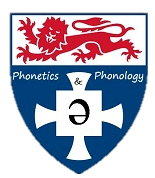-
News:
Accent Articulation Conference First Language Acquisition gamification Group focuses Job Laboratory Phonology Lecturer Linguistics Morphology Perception PhD Funding Phonetics Phonetics and Phonology Phonology Professor Project on Tyneside English Psycholinguistics R Research associate science open day Sociolinguistics Sociophonetics Speech Signal Analysis Speech signal processing statistics Workshop
Author Archives: Caitlin April Ellen Halfacre
Speech Signal Processing in R – student experience
Abdulrahman Dallak (IPhD Phonetics & Phonology) In this two-day workshop we covered some of the state-of-the-art techniques in processing and visualising acoustic and ultrasound data in R. Chris started the workshop talking about how he has been using these advanced … Continue reading
Job: Lecturer in Phonetics and Phonology
Newcastle University’s School of English Literature, Language and Linguistics is looking to appoint a full-time lecturer in Phonetics and Phonology. For current researchers in this area at the university you can see the Phonetics & Phonology research groups people page. More Information Full job … Continue reading
R Workshop on Speech Signal Analysis: Dr Chris Carignan #SpeechSignalR
updated 12 July 2021 We are very happy to announce that Dr Chris Carignan will be leading a workshop on speech signal analysis in R. The workshop will take place remotely via Zoom on 13th and 14th July 2021. Please … Continue reading
We’re Hiring! Professor of Linguistics
Many of you will know that long-standing Newcastle phonologist, SJ Hannahs, retired in January last year. However, it’s not all bad news, the School of English are hiring for a Professor of Linguistics. Closing Date: 12/02/2020Interview Date: 26/03/2020 More information … Continue reading
19th International Congress of Phonetic Sciences – Caitlin Halfacre
Post originally appeared on the PhilSoc Blog In August 2019, I was supported by a PhilSoc travel bursary to attend the 19th International Congress of Phonetic Sciences, to present a poster. The conference was in Melbourne, hosted by The Australasian … Continue reading
Introduction to Ultrasound Tongue Imaging
Training in the usage and analysis of UTI (Ultrasound Tongue Imaging) with Natasha Zharkova by Andreas Krug Over the course of two sessions, Natasha introduced us to the use of ultrasound tongue imaging in linguistics research. We learned about data … Continue reading
Lecturer Position in Phonetics & Phonology
The School of English Literature, Language and Linguistics wishes to appoint an outstanding scholar and teacher as a Lecturer in Phonetics and Phonology. Deadline – 7th July 2019 Candidate You will have a PhD, either in hand or near completion, … Continue reading
Teaching Fellow Position in Phonology
The School of English Literature, Language and Linguistics wishes to appoint an outstanding scholar and teacher as a full-time teaching fellow in phonology for 12 months fixed-term, to start 15th January 2019. https://www.jobs.ac.uk/job/BOG623/teaching-fellow-in-phonology-b172223a Candidate You will have a PhD, either … Continue reading
Posted in Job Vacancies
Tagged Job, Morphology, Phonetics, Phonology, Sociolinguistics
Leave a comment
Research Group Meeting 08 Nov 2018 – Ebtehal Asiry & Jane Stuart Smith
Last week we were very privileged to host Ebtihal Asiry and Jane Stuart-Smith at our research group meeting. Ebtihal presented on “Investigating phonological variation in the English of Iraqi Arabs in two UK cities: London and Glasgow” (slides here), her … Continue reading
PhD Studentships
Applications are invited for PhD studentships in linguistics and speech sciences at Newcastle University. We encourage applicants who are interested in all aspects of speech perception, production and learning. Studentships, to start in October 2019, will be awarded via open … Continue reading

